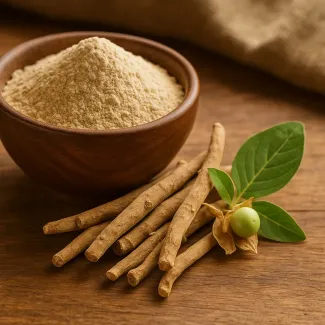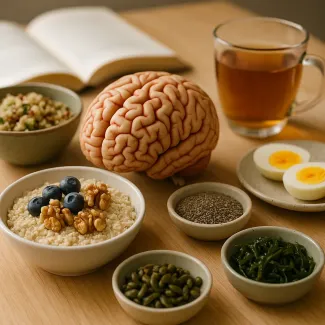
Discover How Ashwagandha Can Naturally Support Your Mental and Physical Well-Being
A closer look at how this ancient adaptogen empowers your 30s
Ashwagandha, a powerful adaptogenic herb, has been used for centuries in Ayurvedic medicine, but its relevance has surged for people in their 30s looking to better manage modern challenges such as stress, fatigue, sleep issues, and low energy. As this decade brings increased career pressure, relationship dynamics, and family responsibilities, many are turning to natural remedies that provide holistic balance without the side effects of synthetic alternatives.
Unlike quick fixes, ashwagandha works by supporting your body’s ability to adapt to stress, regulate energy production, and harmonize your internal systems. Understanding its mechanisms and how to incorporate it into your daily routine can be a transformative part of your health journey.
Why your 30s are the perfect time to explore adaptogens
Life in your 30s is a blend of ambition and increasing responsibility. With deadlines, parenting, social obligations, and health awareness intersecting, the nervous system can become overloaded. Chronic stress in this phase can begin to affect cortisol levels, leading to difficulty sleeping, poor focus, digestive upset, hormonal shifts, and emotional instability.
This is where adaptogens like ashwagandha shine. Unlike substances that merely mask symptoms, ashwagandha encourages physiological resilience. It supports multiple systems simultaneously—particularly the endocrine system, central nervous system, and immune function—making it a multi-dimensional ally in your 30s.
Understanding how ashwagandha supports stress relief
Ashwagandha has become popular primarily due to its ability to regulate the body’s stress response. It helps modulate cortisol, the hormone released during periods of physical and emotional stress. Elevated cortisol over extended periods can interfere with sleep quality, immune function, and mental clarity.
By influencing the hypothalamic-pituitary-adrenal (HPA) axis, ashwagandha helps reduce feelings of anxiety and promotes a sense of grounded calmness. This is especially helpful for those dealing with:
- Persistent mental fatigue
- Increased irritability
- Sleep disturbances linked to overthinking
- Tension headaches or muscle tightness
The herb does not create a sedative effect. Instead, it allows the body to regulate itself better, improving adaptation to stressors over time.
The connection between ashwagandha and better sleep patterns
One of the most frequently reported benefits of ashwagandha is improved sleep quality. This is particularly valuable for adults in their 30s who experience:
- Difficulty falling asleep
- Interrupted sleep due to racing thoughts
- Non-restorative sleep even after 7–8 hours in bed
Ashwagandha promotes restful sleep by supporting GABA receptors, which are involved in regulating sleep cycles. Its ability to reduce cortisol levels also helps lower night-time alertness, which is often caused by stress-induced insomnia.
Incorporating ashwagandha into an evening routine—especially when combined with magnesium, L-theanine, or a mindfulness practice—can naturally enhance the body's readiness for deep and restorative sleep.
How ashwagandha increases natural energy without stimulants
Unlike caffeine or other stimulants that can create a spike-crash cycle, ashwagandha supports steady energy production throughout the day. It works at the mitochondrial level, improving the way your cells produce and use energy.
Many people who begin taking ashwagandha notice:
- Less mid-day exhaustion
- Increased focus and productivity
- Better morning energy levels
- Less dependency on sugar or caffeine
This is especially beneficial for professionals, parents, or anyone experiencing burnout symptoms in their 30s. Because energy depletion is often tied to chronic inflammation or hormonal imbalance, ashwagandha’s anti-inflammatory properties provide systemic relief.
Hormonal balance and ashwagandha: A powerful connection
Hormonal fluctuations aren’t limited to women in perimenopause or men in andropause. Adults in their 30s often experience changes in thyroid function, testosterone, estrogen, or insulin sensitivity due to stress, poor sleep, or nutrient deficiencies.
Ashwagandha has shown potential to:
- Support thyroid hormone levels, particularly T3 and T4
- Promote testosterone balance in men, improving vitality and libido
- Reduce cortisol-driven suppression of reproductive hormones in women
- Encourage more stable insulin and glucose metabolism
By integrating ashwagandha into a broader routine that includes adequate sleep, whole food nutrition, and regular movement, it becomes part of a hormone-friendly lifestyle.
Enhancing mental clarity and reducing brain fog with ashwagandha
Cognitive overload and brain fog are increasingly common in people juggling modern responsibilities. Ashwagandha supports cognitive health by reducing oxidative stress in the brain and boosting levels of acetylcholine, a neurotransmitter essential for memory and focus.
Benefits may include:
- Sharper mental clarity
- Faster information processing
- Reduced mental fatigue
- Better emotional regulation
This is ideal for anyone navigating demanding work schedules, parenting responsibilities, or digital overstimulation.
Gut health and the adaptogenic support of ashwagandha
A lesser-known benefit of ashwagandha is its role in supporting gut health. Because the gut-brain axis is deeply linked to stress and mood, reducing cortisol levels can improve symptoms such as:
- Bloating
- Irregular digestion
- Cravings
- Mood swings
Ashwagandha’s natural anti-inflammatory properties can also help modulate the gut microbiome, encouraging a healthier balance of beneficial bacteria and improving nutrient absorption—essential for people in their 30s dealing with energy dips or skin issues linked to gut imbalance.
Supporting the immune system through a calmer nervous system
A strong immune system isn’t just about avoiding illness—it’s about resilience. Stress-induced immune suppression can lead to frequent colds, allergies, or flare-ups of autoimmune symptoms.
Ashwagandha helps build resilience by:
- Reducing chronic inflammatory markers
- Supporting white blood cell activity
- Calming overactive immune responses
- Enhancing immune memory for better future responses
This makes it a helpful supplement during seasonal changes, high-stress periods, or for those with a history of immune sensitivity.
Who can benefit the most from ashwagandha in their 30s?
While ashwagandha can support individuals across various life stages, it is especially useful for people in their 30s who:
- Are navigating career growth with high expectations
- Are juggling family and personal responsibilities
- Want to avoid long-term effects of chronic stress
- Need consistent mental energy and better sleep
- Struggle with emotional ups and downs
- Are beginning to notice changes in metabolism or skin
Because it works subtly and gradually, it suits those looking for sustainable, daily improvements, rather than fast, artificial results.
How to incorporate ashwagandha into a modern wellness routine
The key to seeing benefits from ashwagandha is consistency. This herb works best when taken daily over time, allowing it to gently build support across your systems.
Forms include:
- Capsules – easy for standardized daily dosing
- Powder – ideal for adding to smoothies, lattes, or energy balls
- Tinctures – fast-absorbing for acute support
- Adaptogenic blends – paired with other herbs like rhodiola or holy basil
For optimal results, it’s best taken with healthy fats, such as ghee, nut butter, or a full-fat smoothie, which enhance absorption.
Start with lower doses and observe your body’s response over the first few weeks. Because it’s a potent herb, its effects compound gently, often within 2–4 weeks.
What to expect when starting ashwagandha
Most users report:
- Less emotional reactivity
- Improved energy within the first few days
- Gradual improvements in sleep
- Greater resilience to mental challenges
- Better digestion and regularity
Side effects are rare but can include mild gastrointestinal discomfort when taken on an empty stomach. People with autoimmune conditions, pregnant women, or those on thyroid medication should consult a practitioner before use.
Ashwagandha is a long-term companion, not a quick fix. The best results come when it's used as part of a holistic lifestyle including sleep hygiene, hydration, movement, and nutrient-dense meals.
Lifestyle habits that enhance ashwagandha’s benefits
To amplify its effects, align your lifestyle with practices that support parasympathetic activation (the body's relaxation mode):
- Follow consistent sleep-wake cycles
- Avoid blue light after 8 PM
- Include magnesium-rich foods like dark greens or pumpkin seeds
- Practice morning sunlight exposure
- Reduce refined sugar and caffeine intake
- Support the gut microbiome with fermented foods and fiber
These practices will not only enhance the benefits of ashwagandha but also promote overall vitality in your 30s.
Ashwagandha and physical performance
Athletic adults or those integrating strength training into their lifestyle may also benefit from ashwagandha’s ability to:
- Enhance muscle strength and endurance
- Improve VO2 max and oxygen utilization
- Support recovery after training
- Maintain lean muscle mass
In your 30s, maintaining muscle and bone strength is critical for healthy aging. Ashwagandha offers a natural tool to help preserve physical resilience alongside mental clarity.
Emotional balance and long-term calm
Perhaps the most profound benefit of ashwagandha is its ability to re-center emotional balance. Those with frequent mood swings, overwhelm, or difficulty resetting after stress often report greater ease in regulating their emotional state.
By gently restoring neurotransmitter balance and buffering against cortisol spikes, it creates space for:
- Greater emotional control
- Clearer decision-making
- More presence in relationships
- A restored sense of internal peace
This is especially meaningful in the third decade of life, when emotional capacity is being tested by both personal and professional roles.
Choosing the right ashwagandha product
Not all ashwagandha supplements are created equal. Look for:
- Full-spectrum root extract
- Standardized KSM-66 or Sensoril® versions
- Products that list withanolide content (typically 5–10%)
- Supplements free from additives, fillers, and preservatives
Choosing a high-quality brand ensures you're actually receiving the adaptogenic benefits, rather than an under-dosed or improperly extracted version.
Consistency, dosing, and bioavailability matter. If your body isn’t absorbing it well, results may be diminished—even if the product looks good on paper.




